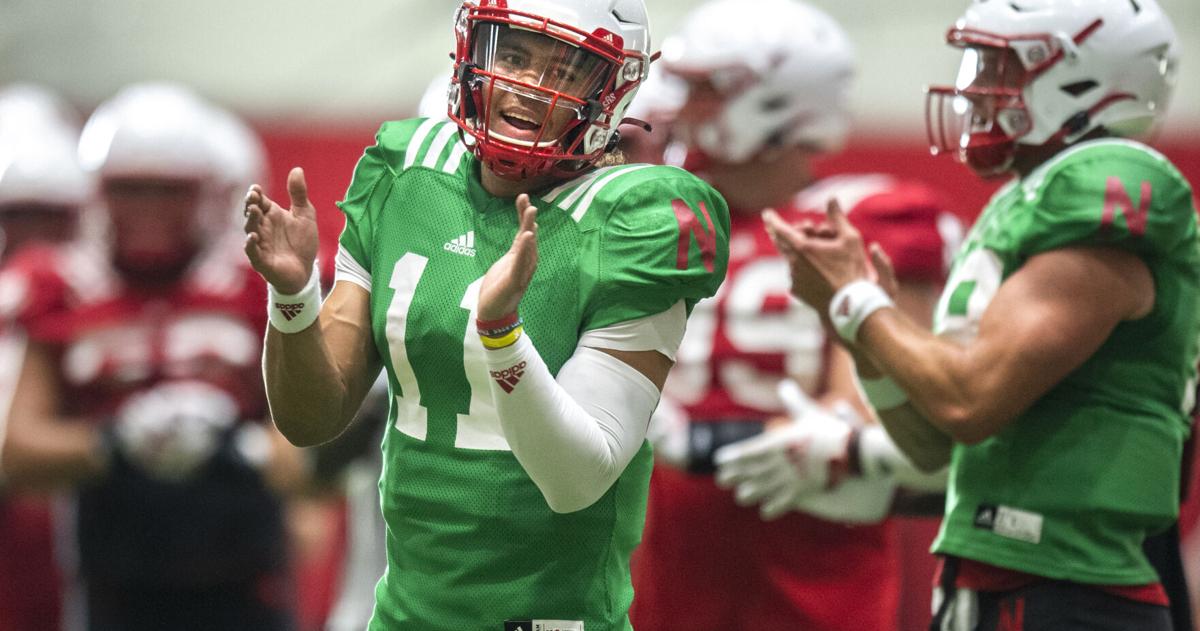
EVAN BLAND
Omaha World-Herald
Casey Thompson outlined his future in pen and crayon.
This was eighth grade — March 2014 — long before he was a high-profile Power Five football player and even before quarterback became his position of choice. When Thompson put his dreams on paper.
“Story of My Life,” reads the title written neatly on a sketch of an orange book. A winding timeline illustrates childhood highlights and predicts the next 13 years of his life. Of 11 entries, eight have something to do with football.
The sport has been Thompson’s consuming focus for as long as he can remember. It has brought him fame and accolades. He’s earning name, image and likeness profits and, probably, a shot a pro ball.
But there are places he can go where his own story is a footnote against the backdrop of time.
People are also reading…
Casey Thompson is an enrolled member of the Kiowa Tribe of Oklahoma.
ANNA REED, OMAHA WORLD-HERALD
This is both improbable and refreshing for the 23-year-old who has lived much of his life in the public eye. Son of an Oklahoma quarterback. Brother of an NFL player. Former starting QB at Texas. Odds-on favorite for the same job at Nebraska this season.
Such titles describe Thompson’s football background but a card he’s carried since early in college reminds him there’s more to life than athletics and himself. That his bloodlines include not only gridiron stars but historical figures whose influence carries on more than a century later.
Thompson is an enrolled member of the Kiowa Tribe of Oklahoma. He receives prayers and support from the tribe headquartered 90 miles southwest of Oklahoma City in the town of Carnegie. He could go to a Sun Dance or powwow there or in neighboring states and be welcomed as much because of who his ancestors are as who he is.
“The best way to stay connected is through the elders of the family and the tribe,” Thompson says. “They’re like a walking dictionary. They’re always there to answer questions and to remind me where I’m from.”
A descendant of chiefs and warriors, Thompson is believed to be the first prominent Husker football player with Native roots. It’s easier to have perspective on thumb injuries and quarterback competitions after growing up hearing tales of men who fought life-and-death battles, including two great-great-great-great grandfathers who were once held hostage by a duplicitous U.S. military commander named George Custer in the late 1860s.
That fighting spirit resides in Thompson, too. There’s something about football that has always brought it out, from his days around Oklahoma City as a standout running back to his emergence as a four-star quarterback recruit and, last year, a starring role with the Longhorns.
Tough, unplanned moments inevitably happen. Thompson has never felt alone in them.
“I’m going to control what I can control and the results will take care of themselves,” Thompson says. “Usually what happens is I come out on top or victorious.”
An ancestry of warriors
Kendal Thompson can’t wait to be there when his younger brother receives a Kiowa name.
The eldest of Charles and Kori Thompson’s three boys was in a situation similar to Casey when he experienced the honor in the summer of 2015. The quarterback had transferred from Oklahoma to Utah late in his college career and found himself more appreciative and curious than ever about his indigenous origins.
The Kiowa are given English names at birth, with Native names usually coming later in life when the family decides an individual is ready. The Kaubin family — Kori’s father, Norman, who was Native — has traditionally handed down names from earlier generations.
Kendal received his at a ceremony that included an elder blessing him by waving over him a smoking bundle of cedar, sage and sweet grass in front of gathered family and friends. The smoke and prayer symbolize armor against the dangers ahead. Kendal — wearing beaded moccasins and other items provided by the tribe — concluded the event by performing a dance by himself. Then family, including Casey, joined in. Tribal members are welcome to give donations, with standard practice being for the honoree to give the gifts back to the community and its members in need.
The oldest Thompson’s tribal name is pronounced “Kooey-shun” — Kiowa language isn’t written — and translated as “Little Wolf.” He now shares the honor with his great-grandfather
“It’s something we take pride in, especially being athletes,” Kendal Thompson says. “Being Native-American athletes, I feel like we can inspire some of the Native-American youth and show that those kids can aspire to be great in sports or off the field as well.”
Football and family ancestry have overlapped since the game began capturing the nation’s imagination in the early 1890s.
Casey Thompson had relatives who played under coach Pop Warner at the Carlisle (Pennsylvania) Indian Industrial School at the turn of the 20th century.
His maternal grandfather, Norman Kaubin, was a standout offensive guard who reached the state-college level and later became a longtime coach at Capitol Hill High School in Oklahoma City.
Kaubin, who died in 2003 when Casey was five, revered Nebraska coach Tom Osborne. Family members buzzed when Thompson chose the Huskers out of the transfer portal in January. It felt like more than a coincidence.
Casey Thompson was often around his mother’s family growing up, especially early on as his father, Charles, pursued a career in the Canadian Football League. Everyone had nicknames — grandpa Norman was “Deda,” great-grandma Ida was “GR” and great-aunt Franda Flyingman is “FA.”
Ida, who died in her late 80s in 2007, was the “OG of the family,” Casey says. She was healthy and strong until the end, with a notoriously stern personality that served the family well. Flyingman — Norman’s sister who in Kiowa terms is considered a grandmother to Casey — is an expert on her family history and active in tribal affairs. Both were central figures in Casey’s Native upbringing.
Flyingman doesn’t yet know what Casey’s Kiowa name will be, but it will be decided by those who know and love him in the months to come. He doesn’t give up — that could fit in a Kiowa name — as he’s shown through winning a starting job at Texas and overcoming a thumb injury to likely repeat the feat in Lincoln. He obsessively pursues perfection, manifested in ways both obvious (like thousands of hours and counting of film study) and subtle (his closet wardrobe is color-coded).
“I know we need to do Casey’s name soon,” Flyingman says. “It’s his time. He’s a strong character. He comes from a line of men that were tough and mean. They were shrewd and smart.”
One was Lon Ahpeatone (pronounced ahp-ee-ton), the last chief of the Kiowa and a great-great-great-grandfather to Casey. He was most known for dispelling to his people the “Messiah Craze” of the 1890s — the belief of an imminent apocalypse with life as they knew it ending after the Dawes Act of 1887 established breaking up reservations for individual Natives to farm.
Another great-great-great grandfather and chief is named in a U.S. Supreme Court case — Lone Wolf v. Hitchcock — that ultimately decided in 1903 Congress could unilaterally alter a treaty with an American Indian tribe.
Perhaps the most famous is Satanta (pronounced say-TAN-day), a Kiowa war chief in the 1860s and 1870s and great-great-great-great grandfather to the Nebraska quarterback. He signed multiple treaties. He once stole a bugle from a skirmish with U.S. soldiers and played it in future encounters to cause confusion.
Satanta was taken into custody multiple times including once by Custer, who went back on a truce and held him until the Kiowa people moved to a reservation in southwestern Oklahoma — the tribe had once lived as far north as Montana and the Rocky Mountains. Satanta later died in a prison in Huntsville, Texas, jumping out of a second-story window in 1878 when told he would never be released.
Casey Thompson lists other major nations he grew up around in OKC. Cherokee. Chickasaw. Darrell Flyingman — Franda’s husband — for a time was governor of the Cheyenne and Arapaho Tribes of Oklahoma.
Thompson’s direct ancestors have as compelling a history as any of them.
“Kiowa is right there,” Thompson says. “I’m happy to be part of the tribe.”
A planner and perfectionist
That piece of paper on which Thompson mapped out his life? So far, so good.
He accurately predicted a year in advance when he would earn his first football scholarship offer — it came from SMU in May 2015.
He correctly called that he would be an early high school graduate so he could enroll in college sooner.
He’d take a mulligan on his school choice (he drew an Oklahoma Sooners logo but nothing from Texas or Nebraska). Same with his NFL draft year (he wasn’t selected in 2021).
Thompson is still theoretically on track to be married with children and a reigning world champion by 2027.
“He had it a little bit off; he wanted to get in the draft earlier,” Kori Thompson says. “He could still win the Super Bowl in 2026. He’s dead serious about it.”
Casey Thompson is a planner. Always has been. He put together a coaching gig by age seven, borrowing cones and other training equipment from his father to set up at a football field a few houses down. Neighborhood kids paid him for lessons, with young Casey running drills with a whistle around his neck and a clipboard in hand.
He also started a shoe-cleaning business, earning $5-10 for each service using materials he would purchase every year from a popup tent outside the Cotton Bowl before the Texas-Oklahoma game. He bought retro Jordans and other footwear, cleaned them and sold them at a profit.
Says Flyingman: “When we would see him, he would say ‘Your shoes need a little bit of work.’”
Thompson can still expound on the finer details of shoe maintenance. Knowing the fabric is priority No. 1, he says. Next is understanding how to clean the laces — some can go in the washer, some can be bleached, some should be scrubbed. He uses a toothbrush and soap in a pinch.
Thompson traded toys for tidying up and vacuuming the house on his own by the time he was three. These days he regularly cleans the inside of his football helmet and washes his shoulder pads every couple weeks. He washes his workout shoes to keep them from getting smelly.
“Nobody else does this,” he says with a smile. “… I’ve always been a cleaner and perfectionist at heart.”
An eye for details and unusual memory recall shocked his mother growing up. She would bump a lined-up shoe a quarter inch and hear about it. He once asked her about the brand of a shoe worn by a stranger he saw in a convenience store a year earlier, intricately describing the design.
That focus is now on football and football only.
Thompson removed emotion from his offseason transfer decision, writing out pros and cons about each school’s coaching staff and offensive history. He knows enough about Kenny Pickett — the Heisman Trophy finalist that NU offensive coordinator Mark Whipple worked with last year at Pittsburgh — to fill a few scouting reports.
Thompson took Nebraska offensive linemen out to dinner and bowling in the winter and brought his iPad along to study plays. Outside pressure at Texas never bothered him — missed in-game opportunities, often during some of his best performances, eat at him more. He’s practical, Kori Thompson says, to the point that he’ll easily choose getting a teammate right on the field even if it risks the friendship.
“He’s tough; he’s brutal,” Kori Thompson says. “In his mind, he’s like, ‘Why do you want to go out every night on the weekend when you don’t even know all your plays? You can have fun after you go to the league.’”
Kendal Thompson likened his brother’s work ethic and drive to Los Angeles Rams coach Sean McVay, whom Kendal spent time with in Washington and L.A. What can come off as “weird” behavior at first is actually all-in commitment.
“I’ve been in the pros and been around a lot of quarterbacks who get paid a lot of money to do what he does,” Kendal Thompson says. “I think he prepares and goes about his days just like those guys. I think if he continues to do that, good things will happen for him and good things will happen for the University of Nebraska.”
Extensive preparation and memory allow him to reference specific moments in just about any game or practice, recent or otherwise. He does it with media members, coaches and teammates alike. Fellow Texas transfer and receiver Marcus Washington has quickly adjusted to Nebraska’s offense in part because of how detailed Thompson has been in their offseason film sessions translating terminology.
Thompson’s mind also takes him into other nuanced directions.
How many laces are on a football. The difference between leathers on the ball. How to optimize daily and weekly schedules. He’s working with Nebraska sports psychology to be in the moment but still finds himself mulling over — if not always planning for — the future.
“I wonder if the broadcasters or ESPN or these TV companies realize (that) to watch the game you have to see the defense and the coverages,” Thompson says. “But they just like always zoom in (on the quarterback). Little things like that are what I think about when I’m watching the game of football.”
Blending of worlds
The Thompsons would usually attend major tribal gatherings during summers and holidays. Red Earth festivals. The Gourd Clan celebration.
They weren’t regulars at every weekend powwow and Sun Dance, though, while growing up with busy sports schedules.
In a way, Casey says, the split time is reflective of his diverse heritage. Extended family that sat in the bleachers for his games often ran the color gamut, from African-American relatives on his father’s side to Whites and Natives on his mother’s.
His full name is Casey Deion Thompson, with the middle name an homage to former NFL star Deion Sanders and a reminder from Dad of Casey’s potential. Charles embraced Kori’s Native background as well — he used to wear a headband at Oklahoma that read “Hanta Yo,” a Lakota-Sioux term understood to mean “clear the way.”
Thompson — the middle of three boys — knows the diversity serves him well, especially in the melting pot that is a college football locker room. He doesn’t identify more as one ethnicity than another.
“Warriors never quit” is a message a Native chief once put in Kendal’s locker during his time at Utah, and Casey feels it, too. He’s playing for himself and his team, yes, but also Native generations before him and ones ahead of him that can still be inspired by what is possible.
Recent pro quarterbacks like Sam Bradford (Cherokee), Bryce Petty (Chickasaw) and Tyler Bray (Citizen Band Potawatomi) have done it. Now Thompson figures it’s his time, on a Nebraska stage new to Native influence.
Channel that warrior spirit, says one side of his family. Have a dog mentality, says another.
Somewhere in the overlap is Thompson. A planner. A fighter. Armed with a conviction that has endured the test of time.
“He’s smart and he’s not afraid,” Flyingman says. “He doesn’t give up and he doesn’t get mad. He looks at options and figures it out — that’s the best thing about him.”
The 2022 Nebraska football schedule
Northwestern Wildcats

When: 11:30 a.m., Aug. 27
Where: Dublin, Ireland
2021 record: 3-9, 1-8 Big Ten
Nebraska’s record against: 9-6
Last meeting: Nebraska won 56-7 (Oct. 2, 2021)
North Dakota Fighting Hawks

When: 2:30 p.m., Sept. 3
Where: Lincoln, Nebraska
2021 record: 5-6, 3-5 Missouri Valley
Nebraska’s record against: 1-0
Last meeting: Nebraska won 33-0 (Sept. 23, 1961)
Georgia Southern Eagles

When: 6:30 p.m., Sept. 10
Where: Lincoln, Nebraska
2021 record: 3-9, 2-6 Sun Belt
Nebraska’s record against: Never played
Oklahoma Sooners

When: 11 a.m., Sept. 17
Where: Lincoln, Nebraska
2021 record: 10-2, 7-2 Big 12
Nebraska’s record against: 38-46-3
Last meeting: Oklahoma won 23-16 (Sept. 18, 2021)
Indiana Hoosiers

When: 6 or 6:30 p.m., Oct. 1
Where: Lincoln, Nebraska
2021 record: 2-10, 0-9 Big Ten
Nebraska’s record against: 8-10-3
Last meeting: Indiana won 38-31 (Oct. 26, 2019)
Rutgers Scarlet Knights

When: 6 p.m., Oct. 7
Where: Piscataway, New Jersey
2021 record: 5-7, 2-7 Big Ten
Nebraska’s record against: 5-0
Last meeting: Nebraska won 28-21 (Sept. 18, 2020)
Purdue Boilermakers

When: Oct. 15
Where: West Lafayette, Indiana
2021 record: 8-4, 6-3 Big Ten
Nebraska’s record against: 5-5
Last meeting: Purdue won 28-23 (Oct. 30, 2021)
Illinois Fighting Illini

When: Oct. 29
Where: Lincoln, Nebraska
2021 record: 5-7, 4-5 Big Ten
Nebraska’s record against: 13-5-1
Last meeting: Illinois won 30-22 (Aug. 28, 2021)
Minnesota Golden Gophers

When: Nov. 5
Where: Lincoln, Nebraska
2021 record: 8-4, 6-3 Big Ten
Nebraska’s record against: 25-35-2
Last meeting: Minnesota won 30-23 (Oct. 16, 2021)
Michigan Wolverines

When: Nov. 12
Where: Ann Arbor, Michigan
2021 record: 11-1, 8-1 Big Ten
Nebraska’s record against: 4-6-1
Last meeting: Michigan won 32-29 (Oct. 9, 2021)
Wisconsin Badgers

When: Nov. 19
Where: Lincoln, Nebraska
2021 record: 8-4, 6-3 Big Ten
Nebraska’s record against: 4-11
Last meeting: Wisconsin won 35-28 (Nov. 20, 2021)
Iowa Hawkeyes

When: 3 p.m., Nov. 25
Where: Iowa City, Iowa
2021 record: 10-2, 7-2 Big Ten
Nebraska’s record against: 29-20-3
Last meeting: Iowa won 28-21 (Nov. 26, 2021)

Must See
-
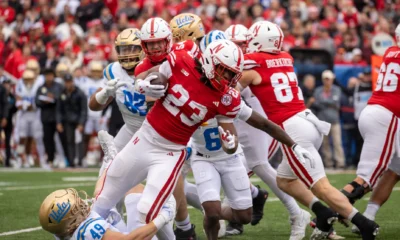

Football
/ 5 months agoHuskers Fight Hard but Fall Short Against UCLA
LINCOLN – The Nebraska Cornhuskers gave it their all on Saturday, with standout efforts...
-
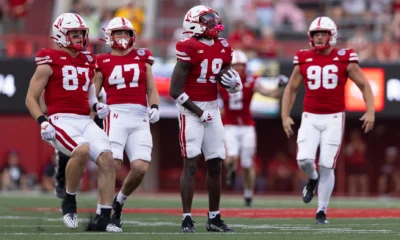

Football
/ 6 months agoGAMEDAY: Nebraska Set to Face Undefeated Indiana in Key Big Ten Showdown
Bloomington, IN – It’s Game Day, Husker Nation! Nebraska (5-1, 2-1 Big Ten) returns...
-
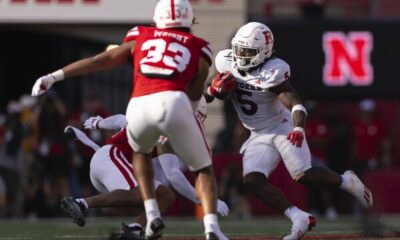

Football
/ 6 months agoBlackshirts Shine as Nebraska Tops Rutgers 14-7 on Homecoming
Lincoln, NE – Nebraska’s Blackshirt defense played a starring role in the Huskers’ 14-7...
By Chris
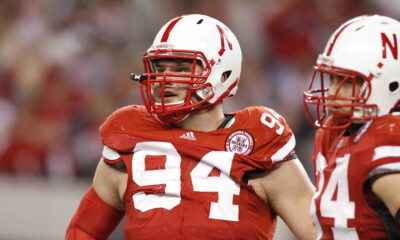

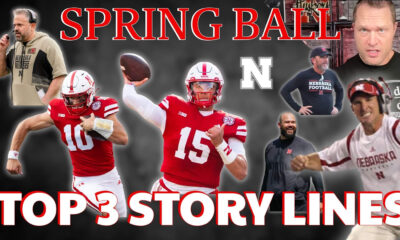










You must be logged in to post a comment Login